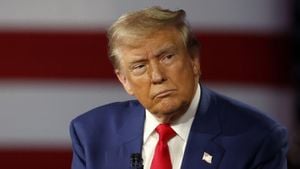US President-elect Donald Trump recently picked Scott Bessent, the CEO of Key Square Capital Management and hedge fund billionaire, as his nominee for Secretary of the Treasury. If confirmed, Bessent will make history as the first openly gay Treasury secretary. Trump described Bessent as one of the world's foremost international investors and geopolitical strategists, emphasizing his belief in Bessent's ability to help "Make America Rich Again".
Bessent's nomination follows Trump's promise to enact significant tax cuts and trade measures. On social media, Trump expressed optimism about Bessent's role, claiming his experience and vision would be invaluable during his administration. The Treasury secretary is tasked with managing the nation’s fiscal policies, overseeing tax collections and public spending, and shaping the financial relationship between the US and other countries.
This nomination is significant for both its economic ramifications and its sociopolitical message. Bessent has previously worked for notable financial entities, gaining prominence at Soros Fund Management, where he served as chief investment officer. His tenure there was marked by savvy financial decisions, including successful bets against the British pound and Japanese yen, which yielded billions for the fund. This knowledge is seen as beneficial for guiding the US economic strategy.
Bessent’s financial career began after earning his degree from Yale University, where he even returned as a professor teaching courses on economic booms and busts. He is known for his sharp insights on global market dynamics and economic policies. His early political contributions were significantly aligned with Democrats, including donations to former presidents Al Gore and Barack Obama, which adds intrigue to his later embrace of Trump’s policies.
Over the years, Bessent transitioned from Democratic patronage to become one of Trump’s most prominent allies. Notably, he played advisory roles during Trump’s campaign, providing insights on making the American economy thrive through deregulation and tax reforms. His recent public statements also reveal support for Trump’s proposed tariffs, which he frames as necessary to renegotiate trade terms favorably for the US.
Upon confirmation, Bessent is expected to address the provisions of the Tax Cuts and Jobs Act initiated during Trump’s previous term, which carried significant budgetary impacts costing possibly between $6 trillion and $10 trillion over ten years. Critics worry about the sustainability of such measures, especially considering the current economic climate amid concerns over the national debt.
Bessent, as Treasury Secretary, would lead extensive policy initiatives, including the management of federal debt and oversight of the nation’s banks. His portfolio would also involve crafting fiscal strategies aimed at revitalizing the economy post-pandemic.
Commentators have noted Bessent’s more moderate stance on tariffs compared to others likely to fill similar roles. He portrays tariffs as negotiation tools rather than absolute demands, a position he defends by saying one of Trump’s goals is fairness rather than mere barriers to trade. This negotiation-centric view may ease some fears among allies concerning potential trade wars.
Bessent has captured media attention not only for his financial background but also for his personal life. He has spoken candidly about being gay, asserting the importance of representation and inclusion even within the upper echelons of government. His success story resonates with many as he exemplifies the American Dream, rising from academic success to lead influential financial organizations.
The current political climate poses questions about how Bessent, if confirmed, will navigate his responsibilities without stifling economic growth. Many are eager to watch his strategies as discussions on broad fiscal policies come to the forefront. How will he address complex issues, such as the balance of tax cuts, tariffs, and the overarching federal debt?
Trump also announced additional key nominations for his administration, including Russell Vought for the Office of Management and Budget and Lori Chavez-DeRemer as Secretary of Labor. This series of appointments indicates Trump's focus on bolstering his economic team with individuals who align closely with his vision.
Given Bessent's extensive experience and strong ties to Trump, many experts predict he will be instrumental in shaping the economic policies of the new administration. His ability to balance aggressive tax cuts, tariffs, and fostering growth will be pivotal for the economic direction of the United States.
Although Bessent's nomination is still subject to Senate confirmation, anticipation grows among financial analysts and policymakers about the potential shifts he might bring to the Treasury. Will he succeed where others have faltered? Only time will tell if his strategic acumen can weather the preceding economic storms and perhaps, lead America toward renewed prosperity.



